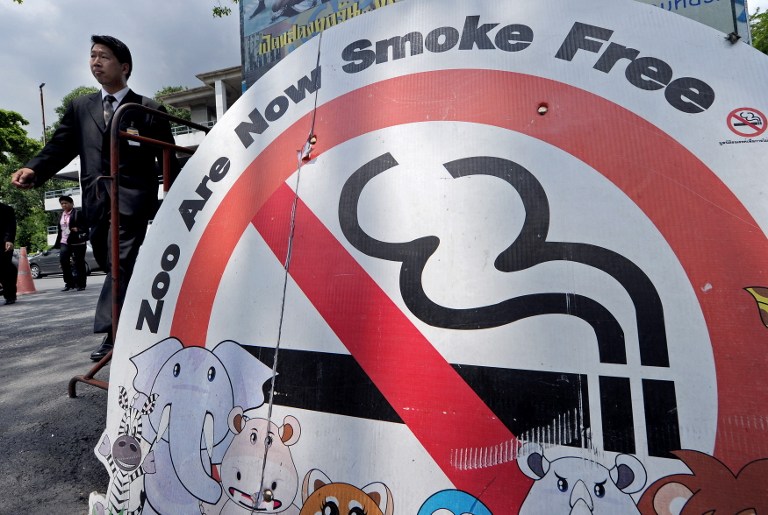Philip Morris says to fight Thai tax evasion charges

A pedestrian walks past a large anti-smoking poster on World No Tobacco Day at Dusit zoo in Bangkok in this 2010 file photo. Philip Morris vowed Thursday, Oct. 3, 2013, to “vigorously defend itself” against Thai tax evasion charges— the latest dispute between the kingdom and the tobacco giant, which recently clashed over warnings on packets. AFP PHOTO/PORNCHAI KITTIWONGSAKUL
BANGKOK—Philip Morris vowed Thursday to “vigorously defend itself” against Thai tax evasion charges— the latest dispute between the kingdom and the tobacco giant, which recently clashed over warnings on packets.
Thailand’s newly appointed Attorney General Athapol Yaisawang told AFP that the indictment had been launched against the maker of Marlboro cigarettes by his predecessor before his recent retirement.
Although the details of the allegations were unclear, Philip Morris said in a statement any prosecution would violate Thailand’s obligations under a World Trade Organization customs agreement.
“Philip Morris Thailand Limited (PMTL) intends to vigorously defend itself against these meritless charges,” it said.
The company said it had not been formally notified by the Thai authorities of a prosecution order, and expressed hope that the new attorney general would review the case.
Article continues after this advertisementThe row follows a Thai court decision in August to suspend government plans that would have forced cigarette companies to slap bigger graphic warnings on packets.
Article continues after this advertisementEnlarged health warnings
The health ministry in April decided to enlarge health warnings—which feature gruesome photographs of smoking-related ailments—from 55 to 85 percent of the surface of both sides of every cigarette packet.
The rules had been due to come into force on Oct. 2.
In a statement released on Monday, the World Health Organization voiced regret that the tobacco industry was “trying to undermine the work of health authorities to protect people from the devastating health effects of smoking.”
Japan Tobacco, one of the world’s biggest cigarette companies with brands including Winston and Benson & Hedges, said in June it was suing the Thai government over the plans.
The tobacco lobby has systematically tried to block laws curbing advertising or raising taxes on cigarettes. But more and more countries are adopting the approach.
European Union member states in June agreed to cover 65 percent of packaging with health warnings.
WHO director-general Margaret Chan said last month that a “massive army” of lobbyists had been deployed to block the bill.